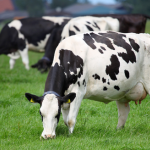In a world of food fads, dairy milk is old news. Even though it's not currently considered a "superfood" the farm-based beverage is just as healthy as it always was. So drink up!
dairy
Consumption of milk and other dairy products has been variously linked to a host of ills — especially by animal rights groups that want us all to avoid any animal products. Here's an example of the type of questionable data such groups often use to hoodwink unwary consumers.
Before you go all science on us, let's be clear: We're not advocating you stop drinking something because you can't spell it. In fact, we are saying just the opposite. If we lived by that mantra, we would dehydrate, since we'd have to forgo Dihydrogen Monoxide (water, duh.)
With low-fat milk, lactose-free substitutes and a firm place in culture and nutrition, it wouldn't seem like dairy products need a new science approach, but there are still things to optimize.
A new study attempts to invoke the Precautionary Principle as justification for warning people against eating meat and dairy. The authors are actually promoting their well-known vegan agenda, covertly.
As if parents of autistic children didn t have enough to contend with, now there s a pseudo-warning from the animal rights/vegan-promoting group PETA alleging that consumption of dairy products is linked to autism.

